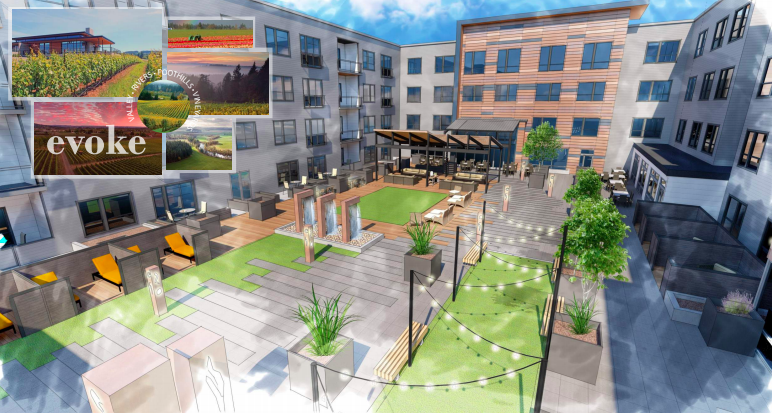With millions of baby boomers reaching retirement age, an evolving landscape for pricing, a red-hot labor market and the looming potential for multiple avenues of disruption, it’s clear the senior living industry faces a new chapter.
All of those forces will shape the industry for years to come, requiring that investors, owners and operators be willing to start fresh rather than sticking with time-tested but increasingly obsolete approaches, according to Eclipse Senior Living CEO Kai Hsiao.
“2020 is, in my view, sort of the reset year for the industry altogether,” Hsiao told Senior Housing News. “If you don’t do things differently … it’s not a good way to move forward.”
As Founder and CEO of Lake Oswego, Oregon-based Eclipse Senior Living, Hsiao is guiding the company through these times of change by preparing it for the senior living landscape of tomorrow. The operator has worked to expand its middle-market offerings, overhaul its pricing model and think differently about turnover and staffing.
There have been challenges along the way. As Eclipse has grown, it’s solely taken on communities in need of a turnaround — including starting out of the gates with more than 70 properties formerly under the Elmcroft Senior Living banner. All the while, the company was building out its senior housing platform as it took on management of new communities, a process Hsiao compares to driving a car while building it.
Chicago-based real estate investment trust Ventas (NYSE: VTR), which holds a 34% ownership stake in Eclipse, has singled out the operator’s communities as a drag on its senior housing operating portfolio’s net operating income.
Yet, Ventas is expanding its relationship with Eclipse even as it restructures and intensifies its senior housing asset management approach overall, in the face of troubled results in its operating portfolio. Most recently, Ventas tapped Eclipse to take on a nine-community former Carillon Assisted Living portfolio in North Carolina. Today, Eclipse has about 120 communities across the U.S., making it one of the largest senior housing operators in the country.
For Hsiao, turbulence is likely and timelines are hard to predict in turnaround situations, but he’s confident that Eclipse is on track with its plans, including new pricing models that should help it compete in a difficult competitive environment.
“People call us not because things are going well,” Hsiao said. “They call us because they want to see a different result.”
Pricing power
Since its founding in 2017, Eclipse has focused on building a multi-brand portfolio with various price levels to reach older adults who lie across the income spectrum. As the former CEO of independent living giant Holiday Retirement, Hsiao was among the first to introduce dynamic pricing to the industry.
For the majority of the communities Eclipse manages, the cost of care was bundled into resident rates, Hsiao said. But Eclipse has worked to unbundle care from the equation, and in doing so drive down the initial cost of senior living.
“In today’s competitive world, more and more people are shopping that entry price point,” Hsiao said. “By having the ability to lower that, I think it makes you much more competitive with everyone else.”
At the same time, the company is looking to emulate the hotel and hospitality world in its multi-brand play. Currently, Eclipse serves the middle market through its Elmcroft and Embark brands. The company also last year announced it’s launching a new high-end brand called Evoke.
Eclipse’s approach is aimed at capturing demand in two expanding market segments.
“That middle market is going to grow exponentially in the upcoming years, and that higher-end market is going to grow at the same level,” Hsiao said. “You want to develop products for all the various buckets out there.”
There are still new ideas left to explore as the industry looks for ways to appeal to a wider swath of potential residents. One method could be repurposing former hospitality assets into senior living communities, driving down the cost per unit in the process.
“No, they don’t have the same rentable-space-versus-common-area ratios as you would with a new build,” Hsiao said. “But, if we’re going after that middle market with a lower price point, maybe that’s okay.”
The need to serve the middle market is underscored by the fact that senior living isn’t the only industry vying for those residents. Multifamily companies and operators with active adult communities are also attracting older adults who don’t want to pay for expensive all-in-one senior living services — and that may be driving up the average age in senior housing, while also causing the industry to understate supply and penetration in some markets.
“The folks who are doing 55-plus or active adult are actually succeeding in that middle market that people say is being underserved, and they just probably don’t know it yet,” Hsiao said. “If you can do active adult or 55-plus, and then supplement it with some private-duty services or some home health, I think that satisfies the need for a lot of folks out there.”
With that in mind, Eclipse has positioned its Embark portfolio to capture a younger demographic interested in a model with unbundled services.
“I don’t think independent living is going to go anywhere anytime soon,” Hsiao said. “It’s just that how you define may evolve a little bit.”
‘New reality’ of staffing
As many in the industry prepare for a possible “decade of disruption,” Eclipse is taking the same line of thinking. In particular, many senior living owners, operators and investors face tough questions regarding staffing.
It’s no secret the industry has spent large amounts of time and money trying to combat turnover in recent years. But with unemployment near record-low levels and a widespread industry staffing shortage, focusing on reducing turnover alone may not be the best approach.
“Other industries have had high turnover for a long time,” Hsiao said. “So, I think senior housing just has to accept this is the new reality.”
Senior living companies should spend as much time recruiting, onboarding and training employees as they do to keep them, he added.
For Eclipse, that has meant building systems to help speed up the hiring and training process. To date, the company has implemented systems related to applicant tracking, training and scheduling — all aimed at making sure the company’s communities are always running on all cylinders.
“I’m focused on time to fill. I’m focused on time to onboard,” Hsiao said. “We need to have the staffing agency mentality and the machine to go with it, because we just need people all the time.”
Senior living providers should follow the lead of other industries, such as hospitality or retail, where it’s common for human resources functions to comprise up to 50% or more of corporate general and administrative (G&A) expenses, Hsiao said.
“If you ask the senior living operator what percentage of their corporate G&A is dedicated to HR, I bet you nine out of 10 can’t answer that question,” he said. “They can tell you what the turnover rate is, but they can’t tell you how much they’ve invested in HR.”
For Eclipse, corporate G&A expenses are more heavily weighted in favor of HR, he added.
At the same time, the company is looking to boost the diversity of its workforce. Among the people leading that charge is Eclipse COO Shamim Wu, who counts Hsiao as a mentor and is consciously looking to hire people from backgrounds and ethnicities that are underrepresented in the senior living industry.
For Hsiao, one goal has been to foster the kind of diversity and inclusivity that he has seen in the hospitality and retail sectors in the past.
“Even though I’ve been in the industry for 10 years, I still see myself as an outsider,” Hsiao said. “I think our life cycle right now is behind everyone else, and it will eventually catch up.”
Preparing for tomorrow
As Eclipse grows in a rapidly changing senior living landscape, it’s doing so with efficiencies of scale in mind. The company will likely top off at around the 150- or 200-community range, as Hsiao believes getting much larger could bring diminishing returns.
There is enough business to grow much larger, however, as many ownership groups are vying for quality operators. For Eclipse, the key is growing in a way that makes the most sense, given its current market presence. That can be tough given the sheer amount of capital flowing through the industry right now.
“Our biggest challenge right now is saying no, politely,” Hsiao said. “I am concerned that there’s too much capital out there, being a former guy from a REIT on the capital side.”
During his stint on the REIT side at HCP — now known as Healthpeak (NYSE: PEAK) — he worked with Justin Hutchens, who has just joined Ventas and the Eclipse board of directors.
And while Eclipse has the confidence to say no to new partnerships, Hsiao worries other providers — especially those looking to quickly grow — won’t have the same level of discipline when talking to financiers who want to rapidly deploy capital.
“We’ve been approached by folks saying, look, we bought this with a five-year horizon, we’re two years into it, we don’t like it, and we’d love to transition it to you,” Hsiao said. “But, by the way, we gave the first operator five years to get done, and we’d like you to get it done in three years.”
Hsiao also still believes there is a risk of disruption from a large player outside the senior living industry, such as a Medicare Advantage insurance company. The thinking is that these companies — many of which have beneficiaries residing in a senior living community — will look at options such as purchasing a senior living operating platform as a way to trim the cost of care.
“The smart operators are the ones who start building and forging those relationships and figuring out what they need from a data standpoint and from a care-planning standpoint,” he said.
Looking ahead, Hsiao anticipates more growth for Eclipse in 2020. The company will also continue to heavily invest in technology and IT. And on the development side, the operator will likely focus more on its growing Evoke brand.
“We’re trying to build a different mousetrap,” Hsiao said. “We’re not just adding movie theaters and stuff like that, but trying to deal with things a little bit differently.”





